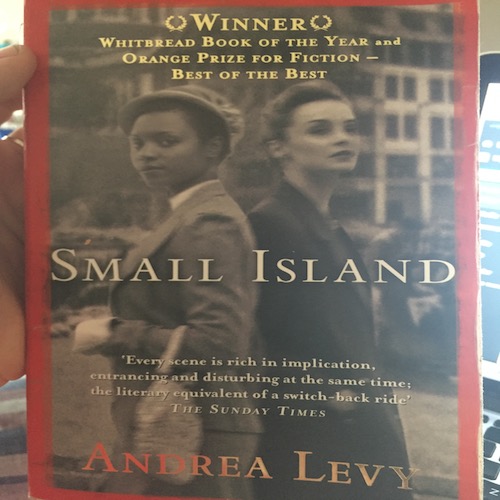Last week, we traveled to Liverpool. After learning about the history of the Beatles on the Magical Mystery Tour Bus, we visited the International Slavery Museum. I found the exhibit to be very well set up — it was both broad-raged yet filled with specific details — and very powerful. I was particularly captivated by a set of videos in which different people, such as a former child soldier in Nigeria, an actor whose great-great-great-great grandfather was a slave who bought his own freedom, multiple victims of human trafficking, and many more spoke about what freedom means to them. One person featured on the videos was award-winning British author, Andrea Levy. Seeing Levy speaking about what freedom means to her was especially powerful because we just finished reading Levy’s Small Island a couple of weeks ago in Arnab’s English class (Literature in Postcolonial London).
Small Island centers around the migration of a Jamaican couple from Jamaica to London in the post-World War II era, highlighting the impacts of migration from both English and Jamaican perspectives. The best-seller won an Orange prize as well as the Whitbread Book of the Year Award in the year it was published (2004) (Mass Reading).
In 2007, Small Island was chosen to represent the 200th anniversary of the slave trade abolition bill. As part of this honor, over 50,000 free copies of the book were distributed from four cities in England (Bristol, Hull, Glasgow, and Liverpool) (all of which have historical ties to the slave trade) in January of 2007 (Mass Reading).
The hope of distributing these free copies was to spark conversation between readers and raise awareness about racism, slavery, and migration. Levy actually went to Liverpool in 2007 to read excerpts from Small Island and lead and participate in discussions about racism and slavery. Andrea Levy said at the time, “I am very excited that Small Island is the focus of this ambitious mass-reading project. I feel deeply honoured that it has been chosen in the year that commemorates the ending of the slave trade, and that the novel, which is set in the 1940s, is being used as the springboard to look back to the important issues of slavery and its aftermath. It has always been one of the aims of my writing to make the history of African-Caribbean people in this country more visible and to show their story to be an important part of British history” (Mass Reading).
Clearly, she has achieved this aim with her best-seller novel. Furthermore, in addition to being featured in the video series, her photo, along with a short biography, is posted with ninety others on the “Black Achievers Wall” in the museum. Seeing her photo posted next to those of Harriet Tubman, Malcom X, Martin Luther King Jr., Rosa Parks, WEB Du Bois, and so many others really highlighted how impactful Levy and her work has been and is (List of Black).
I think that the messages woven throughout Small Island continue to be relevant to current times — in both England, the US, and elsewhere — when discussions about immigration are extremely charged and highly prevalent in the current political arena.
— Meredith Bergman, ’19
Works Cited:
“List of Black Achievers.” National Museums Liverpool.
“Mass Reading Project Tackles the Legacy of Slavery.” The Guardian.
